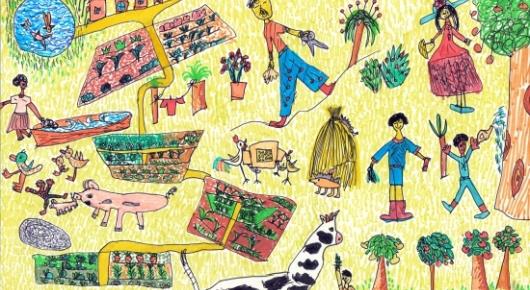Hungarian, Belarusian students design award-winning posters in FAO contest

Two talented children from Europe have been recognized in FAO’s 2017 global World Food Day poster contest for their depictions of how food security and rural development can change the future of migration.
“I wish people would grow lots of fruits and vegetables,” said 6-year-old Dariya Skamaroschcanka, a second-place winner from Belarus. “I wish they would always choose hard work and doing well to others instead of lazing around.”
Dariya’s artwork, which includes trees, gardens, and cattle, was inspired by her grandmother, who grows fruits and vegetables at her weekend house and shares them with others.
In addition to drawing, Dariya enjoys playing chess, reading, dancing, spending time with her little brother, and reading about history and geography.
Hungarian 13-year-old Ida Berta Kluge, who also won a second-place prize, emphasized in her artwork that human compassion, solidarity, and empathy are essential to finding solutions for migration.
She used a robust stone bridge as a metaphor to convey that a solution always is available if everybody wants to overcome the obstacles and pitfalls that present themselves. Ida also repeated a theme present in her first-place poster from the 2015 contest: wheat.
“The spike of wheat symbolizes all the support that is needed by poor farm families in developing countries,” she said. “I liked the wheat as a symbol, since it is featured in FAO’s logo as well.”
Celebrated in more than 150 countries, World Food Day is one of the most popular days on the UN calendar. On 16 October every year, it commemorates FAO’s founding in 1945 and recognizes progress toward the Sustainable Development Goal of reaching Zero Hunger by 2030.
Dariya’s and Ida’s posters express the core message of the current World Food Day theme – that changing the future of migration is conceivable if close attention is given to food security and rural development – creating conditions that allow more people to stay home and have more resilient livelihoods.
“Migration is one of the most challenging questions for Europe,” said Ida, the 13-year-old Hungarian winner, “and willingness to make the right and sometimes hard compromises is necessary for moving forward.”
16 January 2018, Budapest, Hungary
